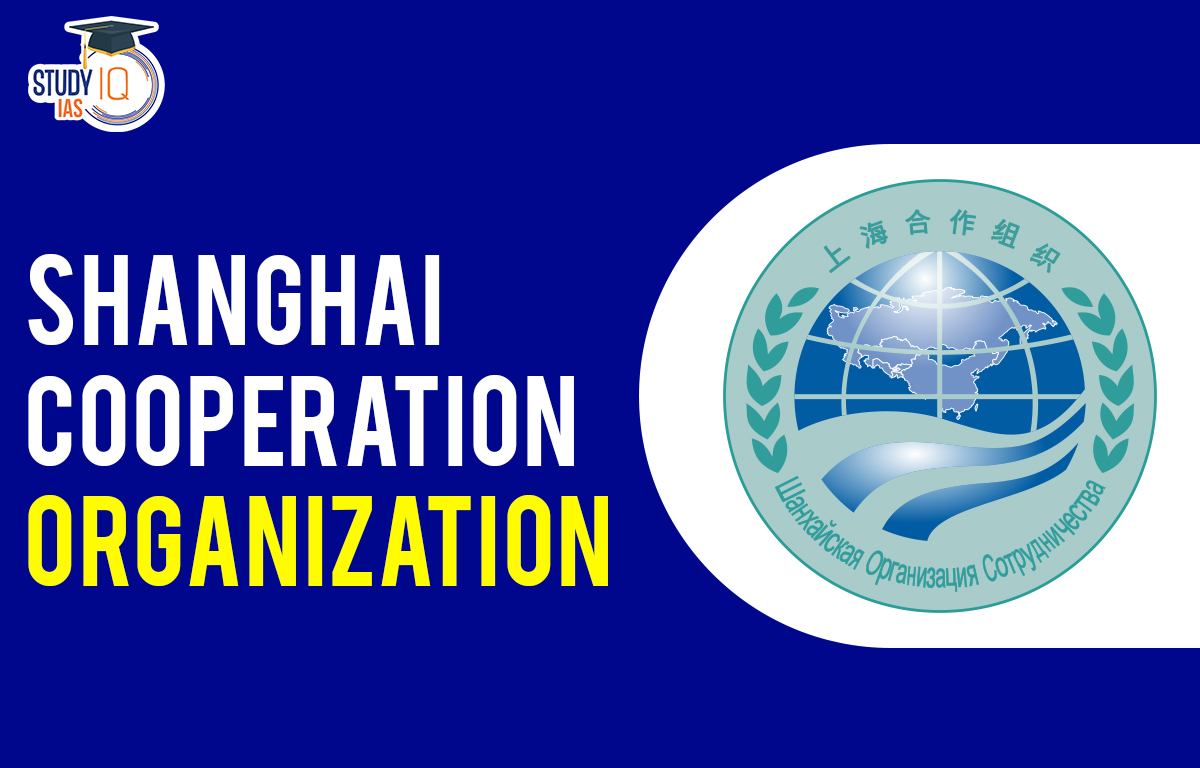Table of Contents
The Shanghai Cooperation Organization (SCO), established in 2001, is a pivotal political, economic, and military alliance. Originally formed to address security concerns in Central Asia, the organization has evolved to tackle various regional issues, including economic cooperation and cultural exchanges. This article explores the SCO’s member states, significant achievements, and ongoing challenges, providing a comprehensive overview relevant for UPSC aspirants.
Shanghai Cooperation Organization (SCO)
Shanghai Cooperation Organization Background
In 1996, the Shanghai Five—China, Kazakhstan, Kyrgyzstan, Russia, and Tajikistan—created a mutual security pact. On June 15, 2001, the heads of state of these nations and Uzbekistan convened in Shanghai to create a new organization with closer political and economic connections. The SCO Charter was adopted on September 19, 2003, after being signed on July 7, 2002. It now has eight members after adding India and Pakistan on June 9, 2017. Several nations are taking part as partners or observers.
Shanghai Cooperation Organization Member Countries
| Category | Countries |
|---|---|
| Member States | China, India, Russia, Pakistan, Kazakhstan, Kyrgyzstan, Tajikistan, Uzbekistan |
| Observer States | Afghanistan, Belarus, Iran, Mongolia |
| Dialogue Partners | Armenia, Azerbaijan, Cambodia, Nepal, Saudi Arabia, Turkey, Sri Lanka |
Shanghai Cooperation Organization Structure and Working
The Shanghai Cooperation Organization’s highest governing body is the Heads of State Council (HSC). The HSC meets once a year to decide and enact policies regarding all of the important issues facing the SCO. The SCO’s Heads of Government Council (HGC) gathers once a year to review the organization’s priorities for multilateral cooperation as well as pressing economic and other cooperation-related concerns.
The organization’s two permanent bodies are the SCO Secretariat in Beijing and the Executive Committee of the Regional Anti-Terrorist Structure (RATS) in Tashkent. The SCO Secretary-General and the Director of the SCO RATS Executive Committee are appointed by the Council of Heads of State for three years each.
Shanghai Cooperation Organization Benefits for India
With the Central Asian nations that make up our extended neighborhood and with whom India has shared millennia of vibrant, diversified ties, the SCO offers a solid platform for communication. Afghanistan and Central Asia are essential for India’s economic development, connectivity, trade, and security.
India has contributed to increased trade, economic, and cultural interaction within the SCO by placing people at the focus of its efforts. It has helped bring stability and prosperity to the area. India has taken steps to demonstrate its commitment to deepening its relationship with the SCO by engaging in the group in a proactive, optimistic, and constructive way.
Shanghai Cooperation Organization Achievements
The Shanghai Cooperation Organization (SCO) has achieved several significant milestones since its inception, contributing to regional stability and cooperation among member states. Here are some key achievements:
- Counter-Terrorism Initiatives: The SCO has established a robust framework for addressing terrorism and extremism. Initiatives like the Regional Anti-Terrorist Structure (RATS) facilitate intelligence sharing and joint operations among member states, enhancing collective security measures.
- Economic Cooperation: The organization promotes trade and economic collaboration through various forums and initiatives. The SCO Economic Forum and the SCO Business Council have been instrumental in fostering partnerships and investment opportunities among member states.
- Cultural Exchange Programs: The SCO actively promotes cultural exchanges through events like the SCO Culture and Arts Festival, enhancing mutual understanding and respect among diverse cultures represented within the organization.
- Expansion of Membership: The inclusion of India and Pakistan as full members in 2017 marked a significant expansion of the SCO, increasing its geopolitical relevance and influence in South Asia.
- Addressing Global Challenges: The SCO engages in dialogue on pressing global issues, including drug trafficking, climate change, and sustainable development, reflecting a commitment to addressing complex challenges that affect regional stability.
- Strategic Partnerships: The SCO has fostered strategic partnerships with observer states and dialogue partners, enhancing its outreach and collaborative efforts beyond its core membership.
Shanghai Cooperation Organization Challenges
- Geopolitical Tensions: Ongoing rivalries, particularly between India and Pakistan, complicate cooperation and consensus within the organizationlitical Systems**: The varied governance structures and ideologies among member states lead to differing priorities, hindering unified action on key issues .
- **Economicificant economic differences among member countries create imbalances in trade and investment opportunities .
- **Counter-Terrorism Challengw extremist groups presents difficulties in coordinating effective responses to security threats .
- Lack of Effective Mechanisms: Slow and ineking processes can impede the organization’s responsiveness to emerging challenges .
- External Influences: The involvement of major powers, like tdds complexity to the region’s dynamics, affecting member states’ strategies and commitments to the SCO .
Shanghai Cooperation Organization UPSC
The SCO is frequently referred to as the “alliance of the East” because to its rising key significance in the Asia-Pacific and its role as the primary security pillar of the region. While some nations may join as observers or guests, many others may become full members of the SCO. It may be necessary to alter the SCO’s charter to address shifting geopolitics and demand from neighboring nations.
It is extremely likely that The Charter will grow and get better. The future of SCO is bright, and it may be able to safeguard the future of this region as well. Students can read all the details related to UPSC by visiting the official website of StudyIQ UPSC Online Coaching.


 Daily Quiz 18 April 2025
Daily Quiz 18 April 2025
 OSSC CGL Syllabus 2025 and Exam Pattern ...
OSSC CGL Syllabus 2025 and Exam Pattern ...
 AI and its Regulation in India, Limitati...
AI and its Regulation in India, Limitati...





















